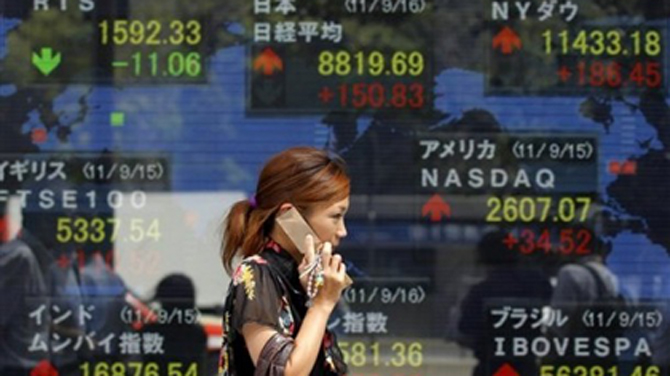Asian Markets Rally after European Bank Decision

Daniel Alpert, managing partner at the New York investment bank Westwood Capital LLC, said the move allows European policymakers to work through the end of the year to prevent a Greek default from upending the global financial system.
"They're gearing up to allow an orderly default" by Greece and to prop up banks that suffer big losses on bonds issued by Greece and other financially ailing countries, Alpert said.
It provides "some time to put institutional firewalls in place so that the whole place doesn't melt down," he said.
Financial markets have been gyrating wildly for weeks on fears that Europe's debt crisis will spin out of control and imperil Europe's banking sector. Moody's ratings agency this week downgraded Societe Generale and Credit Agricole on those concerns.
McCormick said the long-term impact of Thursday's move was uncertain.
For most of the past decade, Greece has run up budget deficits well beyond limits set by the European Union, a group of 27 nations that allow goods and workers to cross their borders freely.
Should Greece default, investors will worry that two much larger EU members, Italy and Spain, might follow. Just the fear that this could happen has led investors to sell those countries' bonds. That selling pressure would drive up yields on those bonds and make it increasingly expensive for that country to borrow. Their financial mess could worsen.
Given Germany's reluctance to bail out Greek banks, Alpert said, other EU nations may choose to prop up their own banks and allow Greece to default.
US banks hold much less in Greek government bonds than European banks do. But the 2008 financial crisis showed that dangers can lie in unexpected places. Some US banks, for example, have sold investors insurance that would require them to pay billions if Greece, Ireland or Portugal defaulted. Others have lent heavily to European banks that might teeter if Greece can't pay its debts.
Investors will now focus on the talks in Wroclaw, Poland. There, the region's financial chiefs and Geithner are huddling to find more lasting solutions to the debt crisis.
The European ministers are expected to finalize the terms of Greece's second bailout. It had initially been agreed upon in July. But it ran into difficulties after Finland demanded extra guarantees for lending Athens money. That sparked a rush of demands from other small eurozone nations.
The ECB hopes the dollar loans will ease the pressure in the short term. The loans will be made in October, November and December at fixed interest rates and for unlimited amounts as long as the bank demanding the loan has collateral.
In Washington, Christine Lagarde, managing director of the International Monetary Fund, called the central banks' move "exactly what is needed" to demonstrate a willingness to engage in a coordinated response to the European debt crisis.
"It shows they will do what it takes to maintain stability in the financial system," Lagarde said in an interview on CNBC TV.
Under the program, the Fed provides dollars requested by the ECB. The ECB distributes that money to commercial banks in Europe. There's no cap on the dollars the Fed can provide. The Fed will receive euros to hold in return for the dollars and will get interest payments on the dollars it provides the ECB.
The Fed's exposure will be to the ECB, not to the commercial banks. And the ECB will be obligated to repay the Fed in dollars.
Wagner reported from Washington. AP Business writers Martin Crutsinger in Washington and Bernard Condon in New York contributed to this report.
« previous 1 | 2 |
- The ‘Virtuous Circle’ of Carrot & Stick Sanctions
- Suu Kyi Curbs Election Campaign After Falling Ill
- Burma Business Roundup (Saturday, March 24)
- Sea Tribunal Ruling: Bangladesh’s Gain, Burma’s Paying
- Burma Business Roundup (Saturday, March 17)
- Floating Toward Honesty: How Burma’s Bent Finances Can Go Straight
- End Near for Burma's Dual Currency Exchange
- Burma Business Roundup (Saturday, March 19)
- Chinese Trade Expo to Focus on Burma
- Dawei Port in Doubt with Bangkok Hub Plan
